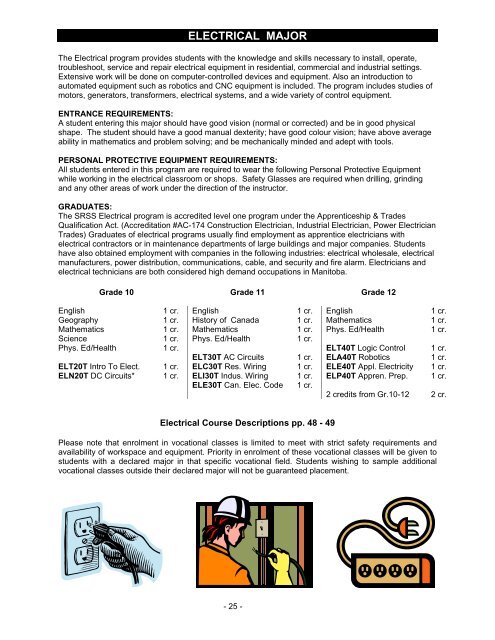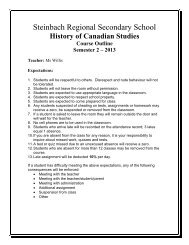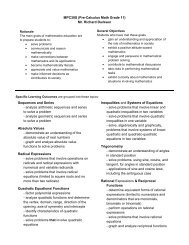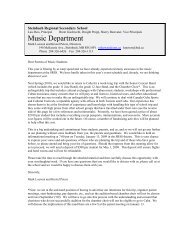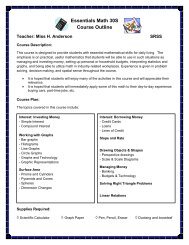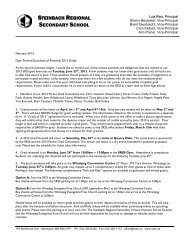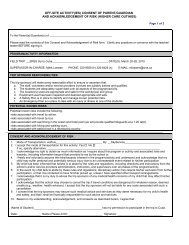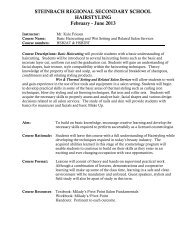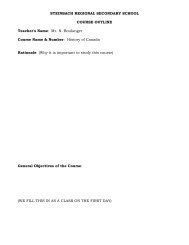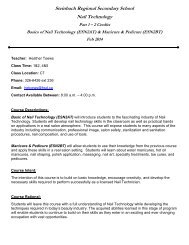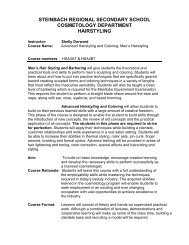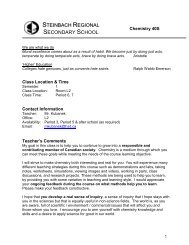SRSS Handbook 2012_13.pdf - Steinbach Regional Secondary ...
SRSS Handbook 2012_13.pdf - Steinbach Regional Secondary ...
SRSS Handbook 2012_13.pdf - Steinbach Regional Secondary ...
Create successful ePaper yourself
Turn your PDF publications into a flip-book with our unique Google optimized e-Paper software.
ELECTRICAL MAJOR<br />
The Electrical program provides students with the knowledge and skills necessary to install, operate,<br />
troubleshoot, service and repair electrical equipment in residential, commercial and industrial settings.<br />
Extensive work will be done on computer-controlled devices and equipment. Also an introduction to<br />
automated equipment such as robotics and CNC equipment is included. The program includes studies of<br />
motors, generators, transformers, electrical systems, and a wide variety of control equipment.<br />
ENTRANCE REQUIREMENTS:<br />
A student entering this major should have good vision (normal or corrected) and be in good physical<br />
shape. The student should have a good manual dexterity; have good colour vision; have above average<br />
ability in mathematics and problem solving; and be mechanically minded and adept with tools.<br />
PERSONAL PROTECTIVE EQUIPMENT REQUIREMENTS:<br />
All students entered in this program are required to wear the following Personal Protective Equipment<br />
while working in the electrical classroom or shops. Safety Glasses are required when drilling, grinding<br />
and any other areas of work under the direction of the instructor.<br />
GRADUATES:<br />
The <strong>SRSS</strong> Electrical program is accredited level one program under the Apprenticeship & Trades<br />
Qualification Act. (Accreditation #AC-174 Construction Electrician, Industrial Electrician, Power Electrician<br />
Trades) Graduates of electrical programs usually find employment as apprentice electricians with<br />
electrical contractors or in maintenance departments of large buildings and major companies. Students<br />
have also obtained employment with companies in the following industries: electrical wholesale, electrical<br />
manufacturers, power distribution, communications, cable, and security and fire alarm. Electricians and<br />
electrical technicians are both considered high demand occupations in Manitoba.<br />
Grade 10 Grade 11 Grade 12<br />
English 1 cr. English 1 cr. English 1 cr.<br />
Geography 1 cr. History of Canada 1 cr. Mathematics 1 cr.<br />
Mathematics 1 cr. Mathematics 1 cr. Phys. Ed/Health 1 cr.<br />
Science 1 cr. Phys. Ed/Health 1 cr.<br />
Phys. Ed/Health 1 cr. ELT40T Logic Control 1 cr.<br />
ELT30T AC Circuits 1 cr. ELA40T Robotics 1 cr.<br />
ELT20T Intro To Elect. 1 cr. ELC30T Res. Wiring 1 cr. ELE40T Appl. Electricity 1 cr.<br />
ELN20T DC Circuits* 1 cr. ELI30T Indus. Wiring 1 cr. ELP40T Appren. Prep. 1 cr.<br />
ELE30T Can. Elec. Code 1 cr.<br />
2 credits from Gr.10-12 2 cr.<br />
Electrical Course Descriptions pp. 48 - 49<br />
Please note that enrolment in vocational classes is limited to meet with strict safety requirements and<br />
availability of workspace and equipment. Priority in enrolment of these vocational classes will be given to<br />
students with a declared major in that specific vocational field. Students wishing to sample additional<br />
vocational classes outside their declared major will not be guaranteed placement.<br />
- 25 -


